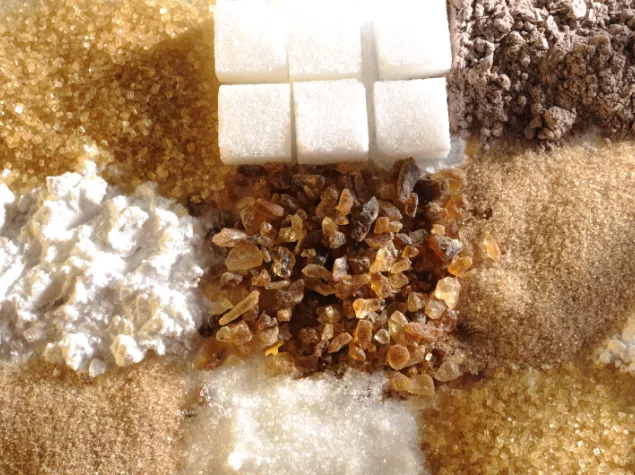UPF and health research
UPFs and health is a new area of research, and it can be difficult to draw conclusions from the currently limited evidence base. Studies conducted across a range of countries have often reported that higher consumption of UPFs are associated with less healthy diets overall (13–15). Though, research conducted in the U.S. suggests some foods classified as UPFs within the NOVA classification system may be beneficial to health and can have a role to play in providing important nutrients (e.g., fibre and iron) (16,17).
Observational evidence has linked high intakes of UPFs with higher risk of developing a range of health concerns, including obesity, high blood pressure, heart disease, type 2 diabetes mellitus and cancer (18–21). Being observational in design, it is difficult to pinpoint whether it is the food processing (or use of food additives) in these studies which are causing the observed effect or other related factor/s, such as overall diet quality (3). Many studies do not consider nutrient intakes or diet quality, making it difficult to separate the effect of processing and food additives from the effect of a food or drink’s nutritional composition (3). When the nutritional quality of the diet is considered, findings are mixed as to whether there is still an association between UPFs and health (22). In addition, the majority of dietary intake data used in these studies haven’t captured the detail needed to accurately classify foods and drinks according to level of processing (6).
A research study analysing the European Prospective Investigation into Cancer and Nutrition (EPIC) data, suggests underlying factors which are unmeasured, inaccurately measured, or uncontrolled for in the analysis, may have a part to play (e.g., smoking and alcohol intake) (20). Other studies suggest that it may be some specific groups of foods driving the observed associations, rather than all ultra-processed foods (10,23–27). Moreover, higher intakes of the bread, cereals, yogurt, desserts and savoury snacks UPF subgroups have been associated with lower risk of adverse health outcomes (23,25–27). This suggests that, in addition to being impractical, grouping all UPF’s together may not be appropriate or helpful (10,23,24).
A randomised controlled trial has suggested UPFs may facilitate overeating and weight gain (28). It is not yet known to what extent processing or nutrient differences in diets is driving the association between UPFs and adverse health outcomes. The study researchers note that the nutritional quality of the high UPF diet does not appear to fully explain the links found between UPFs and health. Although, the calories per gram (energy density) provided by the food was higher in the UPF diet, compared to the minimally processed diet, which may have had an effect (3). Other factors, such as food texture, speed of eating, or the palatability (tastiness) of the test diets may also play a role (29–34). Research is underway to tease apart the relative influence of processing and nutrients, and establish whether processing alone is having a unique effect on health outcomes reported to date (3).
Therefore, UPFs is a complex topic. Until we know more about what might be causing the links between UPFs and health, some researchers argue that drastically reducing or eliminating all UPFs in the diet (which would include most breads, breakfast cereals, ready meals, vegetable-based pasta sauces, low fat fruit yogurts, foods with added nutrients and/or pro-biotics) is not appropriate as it may remove potentially good, affordable, sources of nutrition from diets (5,6,35). Extensive follow up research is ongoing, including controlled feeding trials, to better establish what is driving the observed negative health effects attributed to UPF (3).
References
- Monteiro CA, Levy RB, Claro RM, Castro IRR de, Cannon G. A new classification of foods based on the extent and purpose of their processing. Cad Saude Publica. 2010 Nov;26(11):2039–49.
- Monteiro CA, Cannon G, Levy RB, Moubarac JC, Louzada ML, Rauber F, et al. Ultra-processed foods: what they are and how to identify them. Public Health Nutr. 2019 Apr;22(5):936–41.
- Forde CG. Beyond ultra-processed: considering the future role of food processing in human health. Proc Nutr Soc. 2023 Sep;82(3):406–18.
- Sadler CR, Grassby T, Hart K, Raats M, Sokolović M, Timotijevic L. Processed food classification: Conceptualisation and challenges. Trends Food Sci Technol. 2021 Jun 1;112:149–62.
- Gibney MJ. Ultra-Processed Foods: Definitions and Policy Issues. Curr Dev Nutr. 2019 Feb;3(2):nzy077.
- Gibney MJ, Forde CG. Nutrition research challenges for processed food and health. Nat Food. 2022 Feb 7;1–6.
- Braesco V, Souchon I, Sauvant P, Haurogné T, Maillot M, Féart C, et al. Ultra-processed foods: how functional is the NOVA system? Eur J Clin Nutr. 2022 Sep;76(9):1245–53.
- Sadler CR, Grassby T, Hart K, Raats MM, Sokolović M, Timotijevic L. “Even We Are Confused”: A Thematic Analysis of Professionals’ Perceptions of Processed Foods and Challenges for Communication. Front Nutr. 2022 Feb 23;9:826162.
- Astrup A, Monteiro CA. Does the concept of “ultra-processed foods” help inform dietary guidelines, beyond conventional classification systems? Debate consensus. Am J Clin Nutr. 2022 Dec 19;116(6):1489–91.
- Scientific Advisory Committee on Nutrition (SACN). GOV.UK. 2025. Processed foods and health: SACN’s rapid evidence update summary. https://www.gov.uk/government/publications/processed-foods-and-health-sacns-rapid-evidence-update/processed-foods-and-health-sacns-rapid-evidence-update-summary
- Scientific Report of the 2025 Dietary Guidelines Advisory Committee: Advisory Report to the Secretary of Health and Human Services and Secretary of Agriculture. HHS and USDA; 2024. https://www.dietaryguidelines.gov/2025-advisory-committee-report
- Anses - Agence nationale de sécurité sanitaire de l’alimentation, de l’environnement et du travail. 2025. Aliments dits ultratransformés : mieux comprendre leurs effets potentiels sur la santé. https://www.anses.fr/fr/content/aliments-dits-ultratransformes-mieux-comprendre-leurs-effets-potentiels-sur-la-sante
- Steele EM, Popkin BM, Swinburn B, Monteiro CA. The share of ultra-processed foods and the overall nutritional quality of diets in the US: evidence from a nationally representative cross-sectional study. Popul Health Metr. 2017 Feb 14;15(1):6.
- Machado PP, Steele EM, Levy RB, Sui Z, Rangan A, Woods J, et al. Ultra-processed foods and recommended intake levels of nutrients linked to non-communicable diseases in Australia: evidence from a nationally representative cross-sectional study. BMJ Open. 2019 Aug 28;9(8):e029544.
- Moubarac JC, Batal M, Louzada ML, Martinez Steele E, Monteiro CA. Consumption of ultra-processed foods predicts diet quality in Canada. Appetite. 2017 Jan 1;108:512–20.
- Hess JM, Comeau ME, Casperson S, Slavin JL, Johnson GH, Messina M, et al. Dietary Guidelines Meet NOVA: Developing a Menu for A Healthy Dietary Pattern Using Ultra-Processed Foods. The Journal of Nutrition. 2023 Aug 1;153(8):2472–81.
- O’Connor LE, Martinez-Steele E, Wang L, Zhang FF, Herrick KA. Food Processing, According to the Nova Classification System, and Dietary Intake of US Infants and Toddlers. The Journal of Nutrition. 2023 Aug 1;153(8):2413–20.
- Lane MM, Davis JA, Beattie S, Gómez-Donoso C, Loughman A, O’Neil A, et al. Ultraprocessed food and chronic noncommunicable diseases: A systematic review and meta-analysis of 43 observational studies. Obes Rev. 2021 Mar;22(3):e13146.
- Pagliai G, Dinu M, Madarena MP, Bonaccio M, Iacoviello L, Sofi F. Consumption of ultra-processed foods and health status: a systematic review and meta-analysis. Br J Nutr. 2021 Feb 14;125(3):308–18.
- Morales-Berstein F, Biessy C, Viallon V, Goncalves-Soares A, Casagrande C, Hémon B, et al. Ultra-processed foods, adiposity and risk of head and neck cancer and oesophageal adenocarcinoma in the European Prospective Investigation into Cancer and Nutrition study: a mediation analysis. Eur J Nutr. 2023 Nov 22;
- Lane MM, Gamage E, Du S, Ashtree DN, McGuinness AJ, Gauci S, et al. Ultra-processed food exposure and adverse health outcomes: umbrella review of epidemiological meta-analyses. BMJ. 2024 Feb 28;384:e077310.
- Gibney MJ. Ultra-processed foods in public health nutrition: the unanswered questions. Public Health Nutr. 2023;26(7):1380–3.
- Cordova R, Viallon V, Fontvieille E, Peruchet-Noray L, Jansana A, Wagner KH, et al. Consumption of ultra-processed foods and risk of multimorbidity of cancer and cardiometabolic diseases: a multinational cohort study. The Lancet Regional Health – Europe. 2023 Dec 1;35.
- Visioli F, Del Rio D, Fogliano V, Marangoni F, Ricci C, Poli A. Ultra-processed foods and health: are we correctly interpreting the available evidence? Eur J Clin Nutr. 2025 Mar 1;79(3):1–4.
- Chen Z, Khandpur N, Desjardins C, Wang L, Monteiro CA, Rossato SL, et al. Ultra-Processed Food Consumption and Risk of Type 2 Diabetes: Three Large Prospective U.S. Cohort Studies. Diabetes Care. 2023 Feb 28;46(7):1335–44.
- Dicken SJ, Dahm CC, Ibsen DB, Olsen A, Tjønneland A, Louati-Hajji M, et al. Food consumption by degree of food processing and risk of type 2 diabetes mellitus: a prospective cohort analysis of the European Prospective Investigation into Cancer and Nutrition (EPIC). Lancet Reg Health Eur. 2024 Nov;46:101043.
- Vellinga RE, van den Boomgaard I, M A Boer J, van der Schouw YT, Harbers MC, Verschuren WMM, et al. Different Levels of Ultraprocessed Food and Beverage Consumption and Associations with Environmental Sustainability and All-cause Mortality in EPIC-NL. Am J Clin Nutr. 2023 Jul;118(1):103–13.
- Hall KD, Ayuketah A, Brychta R, Cai H, Cassimatis T, Chen KY, et al. Ultra-Processed Diets Cause Excess Calorie Intake and Weight Gain: An Inpatient Randomized Controlled Trial of Ad Libitum Food Intake. Cell Metab. 2019 Jul 2;30(1):67-77.e3.
- Hamano S, Sawada M, Aihara M, Sakurai Y, Sekine R, Usami S, et al. Ultra-processed foods cause weight gain and increased energy intake associated with reduced chewing frequency: A randomized, open-label, crossover study. Diabetes, Obesity and Metabolism. 2024 Nov;26(11):5431–43.
- Fazzino TL, Courville AB, Guo J, Hall KD. Ad libitum meal energy intake is positively influenced by energy density, eating rate and hyper-palatable food across four dietary patterns. Nat Food. 2023 Feb;4(2):144–7.
- Srour B, Fezeu LK, Kesse-Guyot E, Allès B, Méjean C, Andrianasolo RM, et al. Ultra-processed food intake and risk of cardiovascular disease: prospective cohort study (NutriNet-Santé). BMJ. 2019 May 29;365:l1451.
- Galdino-Silva MB, Almeida KMM, Oliveira ADS de, Santos JVL dos, Macena M de L, Silva DR, et al. A Meal with Ultra-Processed Foods Leads to a Faster Rate of Intake and to a Lesser Decrease in the Capacity to Eat When Compared to a Similar, Matched Meal Without Ultra-Processed Foods. Nutrients. 2024 Jan;16(24):4398.
- Teo PS, Lim AJ, Goh AT, R J, Choy JYM, McCrickerd K, et al. Texture-based differences in eating rate influence energy intake for minimally processed and ultra-processed meals. The American Journal of Clinical Nutrition. 2022 Jul 1;116(1):244–54.
- Heuven LAJ, van Bruinessen M, Tang CS, Stieger M, Lasschuijt MP, Forde CG. Consistent effect of eating rate on food and energy intake across twenty-four ad libitum meals. Br J Nutr. 2024;132(4):535–46.
- Tobias D, Hall KD. Eliminate or reformulate ultra-processed foods? Biological mechanisms matter. Cell Metabolism. 2021;(33).








